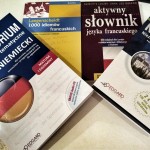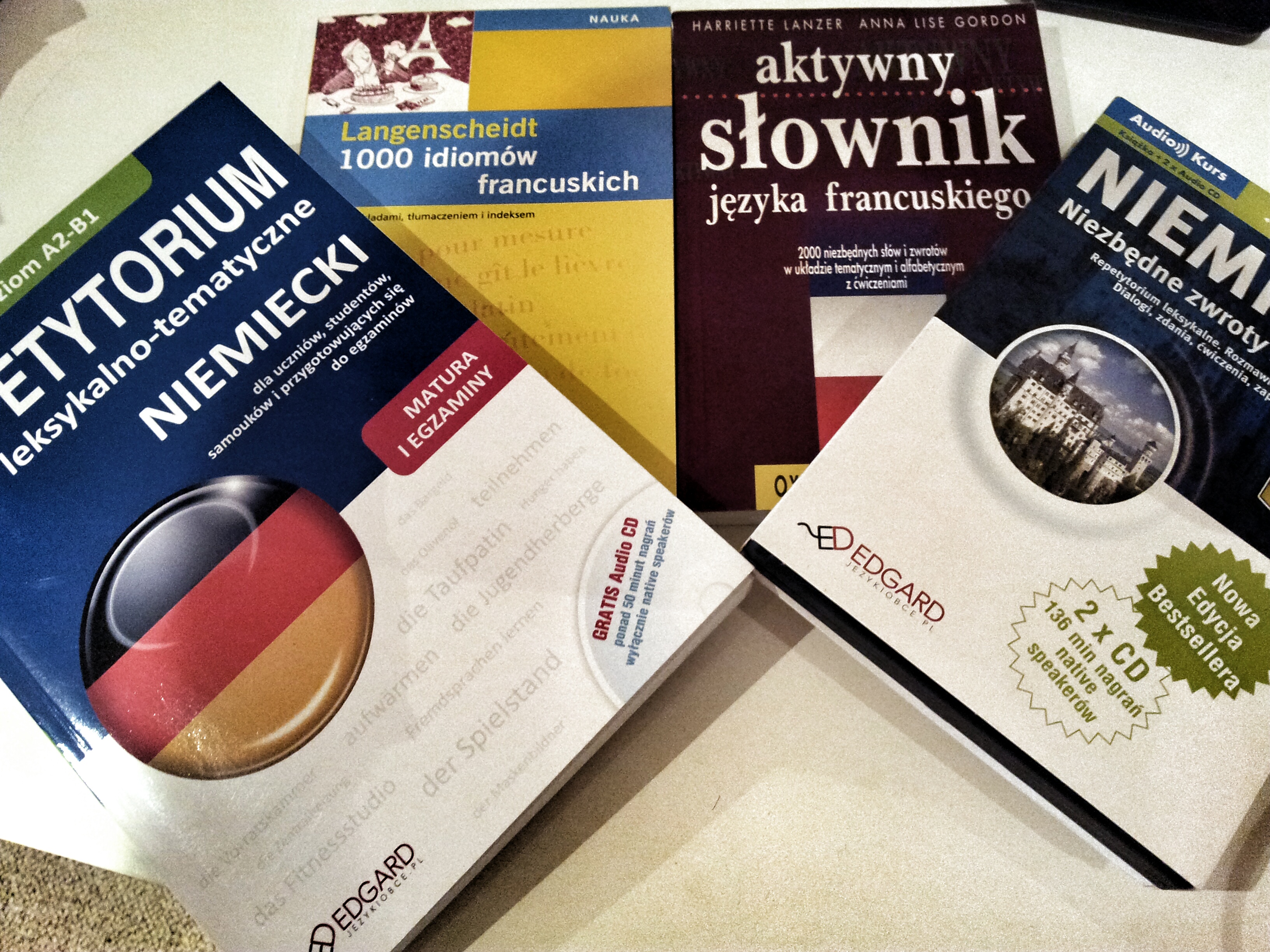 I’m on a mission to find out how affordable language learning could get. I’ve taken up some exciting challenges (and a crazy one about French). Today I’m returning to a question of learning materials: how much does price influence quality for language learning aids?
I’m on a mission to find out how affordable language learning could get. I’ve taken up some exciting challenges (and a crazy one about French). Today I’m returning to a question of learning materials: how much does price influence quality for language learning aids?
1. Gifts for polyglots and the value of long-term passion
I came back from my short trip to Poland with four books (see photo above). I didn’t pay a penny for any of those, and they will definitely help me with my German and French.
Here’s a short history of those items: One of them was a prize for winning a primary school French competition (see, there’s hope for me yet!), one of them – a Christmas gift from my friend (back in 2003), and two more – a prize for winning a translation competition at a radio station.
I’m bragging, but only a little bit and to prove a point. Here it is: if your language learning is a long-term passion, these kinds of gifts and perks will start showing up. Your friends might remember you the next time they pass a book sale. Your colleagues will have no problems picking out a gift for “the language girl.” And even if it’s not a language you’re learning at the moment, don’t chuck this away: you might come back to it (as I did with French).
2. Making do: how to adapt less-than-perfect language learning tools
I don’t do well around paper. I lose notes, crumple and stain pages, get whole notebooks soaked. I’ve moved everything that mattered to Evernote (including lots of language learning research – free for you to enjoy!)
So why, exactly, did I bring four books back? Four paper books?
Simple: I know how to adapt them.
As I was rummaging through my language-learning pile in a flat in my home town, I discarded lots of things that were beyond repair for the moment: old photocopies, useless grammar explanations, textbooks without tapes or CDs. I only took things which I could adapt – tweak, import into a more flexible format, or transcribe onto flashcards.
For a guerrilla language learner, this is a pretty important skill. You will probably never find a resource that’s perfect for you, affordable and in a relevant format. Some kind of adaptation will always be necessary.
Three useful questions that would help you decide for yourself, when picking less-than-ideal materials for learning languages:
– Is there an easy way to overcome the disadvantages here? (e.g. can the CD be easily ripped, will I be able to copy the material onto flashcard software etc.)
– Can I get a more suitable version anywhere? (there’s no point taking a 1998 variation of a Duolingo course back home in a bag. Duolingo is free and works better for me)
– Will I waste too much time trying to “bend” to the material? (e.g. I can still work with CDs (my laptop plays them), but draw the line at cassettes (Walkman! WALKMAN! My kingdom for a Walkman!)
3. Learning French and German through Polish: the bilingual advantage
Here’s the final inspiring thing about those four books (and the last occasion to brag in this blog post). They’re all in Polish – my mother tongue. Normally, I don’t mind using Polish or English for learning new things, as both work just as well. But this made me think for a while. Imagine these three situations:
- – You walk into a Spanish bar knowing some Portuguese.
- – You have just finished a Swedish course and meet your Danish and Norwegian friends.
- – You try to see if there’s any Kanji in the Chinese newspaper you picked up.
All of these situations are likely to be pleasant surprises for you. And even if the languages weren’t as similar as above (Polish and English aren’t), your advantage over a person who had never learnt a language would be obvious. You would tolerate stress better. You would be more adept at reading into ambiguity. Your repertoire of communication strategies would help you in tricky situations…and so on.
The moral is this: learning one language is not really an achievement. It’s a good starting point for more languages.
4. I wrote it all before (but haven’t heard from you yet!)
Click here for a quick guide to making your own learning materials.
Follow this page for more information about my Guerrilla Language Learning Challenge.
And if you have a question or a comment – please use the space below!
Wiktor (Vic) Kostrzewski (MA, DELTA) is an author, translator, editor and project manage based in London. When he works, he thinks about languages, education, books, EdTech and teachers. When he doesn’t work, he probably trains for his next triathlon or drinks his next coffee.
BRAVE Learning (formerly known as 16 Kinds) is a lifelong learning and productivity blog. If you enjoy these posts, please check out one of my books and courses.
My recent publications, and my archive, is now all available on my new project: PUNK LEARNING. Hope to see you there!

